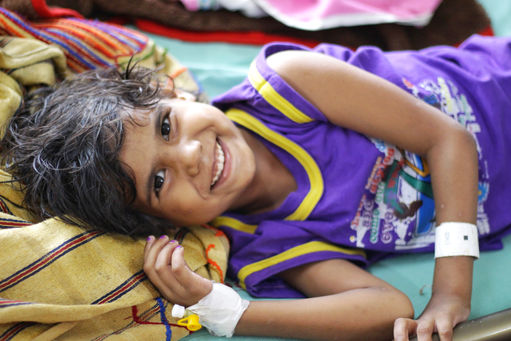
IN
HOSPITALS
One cannot emphasize enough the importance of mental well-being and its relationship with physical health. Medical Clowning or Clown therapy bridges the gap between providing care for physical health and mental health in hospital settings. In healing of the people suffering from various ailments at hospitals, Medical clowning comes to aide in reducing stress and anxiety. Hospital settings are generally gloomy. Clown therapy acts as a distraction therapy; demystifying and humanizing the whole hospital environment for patients.
Clownselors primarily work with children. For children’s development and general wellbeing, an essential right is the right to play, and this should not be denied because of a hospital bed, a serious illness or a chronic medical condition. In fact, play and the stimulus it provides become all the more important in these frightening and anxious moments. The need for children to play in their own way, with their own experiences and emotions while dealing with illness has always been emphasized by experts.

Even as adults, we experience feelings of powerlessness, boredom in healthcare facilities where it is so difficult to communicate and cope. For children, this issue becomes even graver. Hence, clowns here play an important role in reaching out to the child beyond the illness and offer individual, playful intervention. Hospital clowning benefits ill and hospitalized children as well as adults in very many ways in their recovery process and overall well-being. Through interactive play and humor, Clowns create an enabling and supportive environment that stimulates children’s adaptation to the hospital setting, thereby improving their acceptance of medical procedures and staff.
Clownselors help patients deal with the stress of hospitalization and circumvent the accompanying feelings of fear, helplessness and sadness, thus supporting the healing process. It is heartwarming when parents of the ailing children drop a tear of happiness when their child smiles or reacts after days of lying on the bed motionless. Every time we clown, we meet children who would not be drinking or eating anything. After engaging with us, the child would eat and drink which is the only way to her/his recovery. There have been incidents where a child has not smiled or reacted for days and after seeing us and engaging with us; have smiled. At times, children have sat down on their own when they were not even moving their hands before we entered. Almost every time, we get to hear from some parents that our child has been so sad and hasn’t talked to anyone since he has been admitted but today he is happy and has started playing with other children too.

‘These are like angels from heaven who have come to bring smiles at the hospital’ - Parent of a child patient at Civil hospital, Belgaum.
Clowning is not only helpful for patients but the caregivers as well, who are under tremendous stress and pain. It gives a ray of hope to them too. Medical clowns also benefit the community milieu by lightening the mood of healthcare providers and staff.
WHERE WE
VISIT
• Chacha Nehru Bal Chikitsalaya, Delhi
• Apollo Hospitals, Delhi
• Safdarjung Hospital, Delhi
• Kalawati Saran Children’s Hospital (Lady Hardinge), Delhi
• Kailash Hospital, Noida
• Medanta Medicity, Gurugram
• ITS Dental College, Ghaziabad
• SRCC Hospital (Narayana Health), Mumbai
• Guru Tegh Bahadur (GTB) Hospital, Delhi
• Moti Nagar Hospital, Delhi
• Dr Hedgewar Arogya Sansthan, Delhi
• Regional Institute of Medical Sciences, Imphal
• Surya Hospital, Jaipur
• Jindal Hospital, Hisar (Haryana)
• Asha Kiran Home for Mentally Retarded, Delhi
• Civil Hospital & KLE Hospital, Belgaum (Karnataka)

























